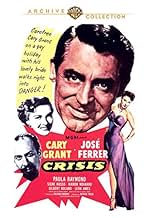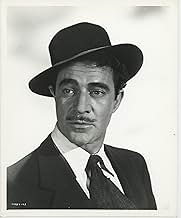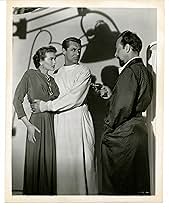De vacaciones en un país latinoamericano, un neurocirujano estadounidense y su esposa se ven envueltos en un levantamiento revolucionario contra un dictador tiránicoDe vacaciones en un país latinoamericano, un neurocirujano estadounidense y su esposa se ven envueltos en un levantamiento revolucionario contra un dictador tiránicoDe vacaciones en un país latinoamericano, un neurocirujano estadounidense y su esposa se ven envueltos en un levantamiento revolucionario contra un dictador tiránico
- Dirección
- Guionistas
- Elenco
- Premios
- 1 premio ganado en total
José Ferrer
- Raoul Farrago
- (as Jose Ferrer)
Lillian Adams
- Nurse
- (sin créditos)
Carlos Barbe
- Friend of Farrago
- (sin créditos)
Orlando Beltran
- Doctor's Assistant
- (sin créditos)
Audrey Betz
- Servant
- (sin créditos)
George Brady
- Student
- (sin créditos)
Robert Cabal
- Very Young Man
- (sin créditos)
Andy Carillo
- Man at Table
- (sin créditos)
Bridget Carr
- Guest
- (sin créditos)
Teresa Celli
- Rosa Aldana
- (sin créditos)
Carlos Conde
- Man
- (sin créditos)
Rita Conde
- Pretty Woman
- (sin créditos)
- Dirección
- Guionistas
- Todo el elenco y el equipo
- Producción, taquilla y más en IMDbPro
Opiniones destacadas
Fans of Cary Grant should see this under appreciated film. It proves that Grant could indeed act - and that he has far greater range than his standard light comedy fare would indicate.
This is not a great movie, but it is a very well made movie. It has high production values. The film features three of the major "Latin Lovers" from the Silent era - Gilbert Roland, Ramon Novarro, and Pedro De Cordoba.
Jose Ferrer and Signe Hasso play a Latin American Dictator and his wife. They are the weakest points in the production - Ferrer insists on "Acting" through every scene. His performance comes across as very dated and unbelievable. Hasso, normally a fine actress, comes across as wooden and barely lifelike.
The weakest point in the production is the script. It insists on being very "politcal" and this detracts from the enjoyment value. Yet, because of this political viewpoint, it treats Latinos with much more respect and consideration than other movies filmed during this era.
This is not a great movie, but it is a very well made movie. It has high production values. The film features three of the major "Latin Lovers" from the Silent era - Gilbert Roland, Ramon Novarro, and Pedro De Cordoba.
Jose Ferrer and Signe Hasso play a Latin American Dictator and his wife. They are the weakest points in the production - Ferrer insists on "Acting" through every scene. His performance comes across as very dated and unbelievable. Hasso, normally a fine actress, comes across as wooden and barely lifelike.
The weakest point in the production is the script. It insists on being very "politcal" and this detracts from the enjoyment value. Yet, because of this political viewpoint, it treats Latinos with much more respect and consideration than other movies filmed during this era.
Most IMDb critics claim that this is unlike any other Cary Grant role, but I think his performance is remarkably reminiscent of "Notorious." Agent Devlin was more romantic, to be sure, but Dr. Ferguson is also a cool, calm, rational, and duty-bound man in a political maelstrom: he's a surgeon, vacationing in a banana republic whose tumor-stricken dictator shanghais him. The result is a trenchant dramatic character, which Grant does very well, supported by Ramon Novarro and Gilbert Roland, who always add quality to a movie. And I'd single out two other performers:
The Spanish composer Vicente Gómez graces only one scene, in a café, but he plays a soulful guitar solo that I wanted much, much more of.
And then there's José Ferrer as the dictator. He almost steals every scene, especially when he watches Grant's amateur surgical team drill into a fake human skull, rehearsing for the surgery awaiting the dictator himself tomorrow. When the rehearsal is done, Ferrer is sweating visibly and fumbling with a cigarette. He makes it easy for you to project yourself into that makeshift O. R. with the student surgical team-- you with a brain tumor and a captive surgeon who makes no effort to hide his antipathy.
But Grant holds his own. "Tell them never to use that instrument on the brain again," he says to his translator. "It might suck a piece right out of the brain." Ferrer hears, of course, and through his sweat he asks, "How did it go?" Grant drops the stitched-up skull in a garbage pail and says, "Oh, it went quite well. But you died."
The Spanish composer Vicente Gómez graces only one scene, in a café, but he plays a soulful guitar solo that I wanted much, much more of.
And then there's José Ferrer as the dictator. He almost steals every scene, especially when he watches Grant's amateur surgical team drill into a fake human skull, rehearsing for the surgery awaiting the dictator himself tomorrow. When the rehearsal is done, Ferrer is sweating visibly and fumbling with a cigarette. He makes it easy for you to project yourself into that makeshift O. R. with the student surgical team-- you with a brain tumor and a captive surgeon who makes no effort to hide his antipathy.
But Grant holds his own. "Tell them never to use that instrument on the brain again," he says to his translator. "It might suck a piece right out of the brain." Ferrer hears, of course, and through his sweat he asks, "How did it go?" Grant drops the stitched-up skull in a garbage pail and says, "Oh, it went quite well. But you died."
This is Richard Brooks' first directorial effort. Examining the work half a century after it was made, the film presents a director who knows how to get the most from his actors through the written word and the way it is spoken. Three actors sparkle: Cary Grant, Jose Ferrer, and Signe Hasso.
Compare Cary Grant's acting in the Hitchcock vehicles and in this. Grant presents a maturity in his speech patterns that do not show up under Hitchcock's direction. I think much of the quality of the performances is probably due to the director who took his first film seriously--probably a lot more than he did in his later career.
All in all, this is a curious film--quite unusual in several ways compared to the average Hollywood products in the Fifties. Is it only a question of humanism winning over all evils? Or more?
Compare Cary Grant's acting in the Hitchcock vehicles and in this. Grant presents a maturity in his speech patterns that do not show up under Hitchcock's direction. I think much of the quality of the performances is probably due to the director who took his first film seriously--probably a lot more than he did in his later career.
All in all, this is a curious film--quite unusual in several ways compared to the average Hollywood products in the Fifties. Is it only a question of humanism winning over all evils? Or more?
I first saw this movie in 1950 when it was released. I thought it was a good drama, more or less accurately portraying many of the problems of Latin American governments, with good dialog particularly between the two male leads. Incidentally, I did not find either character particularly sympathetic, but no matter. Many of the comments here have mentioned the resemblance to Eva Peron of the Signe Hasso character. Just an interesting observation: In the much later made for TV movie, Evita Peron, Signe Hasso and Jose Ferrer both had roles. He was the tango singer who seduced Evita and took her to Buenos Aires. She was the aging actress who befriended the young Dva Duarte and found herself in a jail cell. Of the two movies, Crisis is by far the better film. Evita Peron was a ripoff.
CRISIS remains perhaps the only film that is completely forgotten when lists of Cary Grant films are offered. Even some of Grant's lesser vehicles are discussed, in depth, but Richard Brooks' CRISIS, which features a really stellar cast is 'lost' in contemporary cinema circles. There is no logical reason for this. Grant gives one of his very rare straight dramatic performances -- and one very very different from the dramatic range in NONE BUT THE LONELY HEART. It is a strong, forthright piece of work. The film deserves rediscovery for any number of reasons -- Grant's work, the first sign of Brooks' major talent... and one of the few (if only) Grant films that deals with modern political issues. I had remembered the film very well from my youth and never saw it listed for TV showings or any retrospectives. Thus, finding a rare DVD copy was wonderful ... and, surprisingly, very rewarding. Here's to someone pulling CRISIS out of obscurity and into a rung on the Cary Grant pantheon.
¿Sabías que…?
- TriviaOriginally banned in Mexico, Central and South America.
- ErroresThe doctor announces his fee is ten percent of the patient's income, but does not say whether this means monthly, annual or some other period.
- Citas
Raoul Farrago: At least permit me to thank you. You have done a great service not only to me but to the people of my country.
Dr. Eugene Norland Ferguson: I only saved your life I didn't vote for you.
Raoul Farrago: Neither did they.
[smiling]
- Créditos curiososPROLOGUE: "The time is now. The scene of the action is fictitious, but the forces at play in this story are not fictitious."
- Versiones alternativasAlso available in a computer colorized version.
- ConexionesReferenced in Secret Publicity - Forbes Taylor Remembers the Making of State Secret (2021)
Selecciones populares
Inicia sesión para calificar y agrega a la lista de videos para obtener recomendaciones personalizadas
- How long is Crisis?Con tecnología de Alexa
Detalles
Taquilla
- Presupuesto
- USD 1,616,455 (estimado)
- Tiempo de ejecución1 hora 35 minutos
- Color
- Relación de aspecto
- 1.37 : 1
Contribuir a esta página
Sugiere una edición o agrega el contenido que falta

Principales brechas de datos
By what name was Crisis (1950) officially released in India in English?
Responda
































